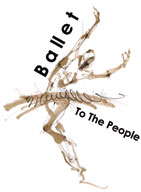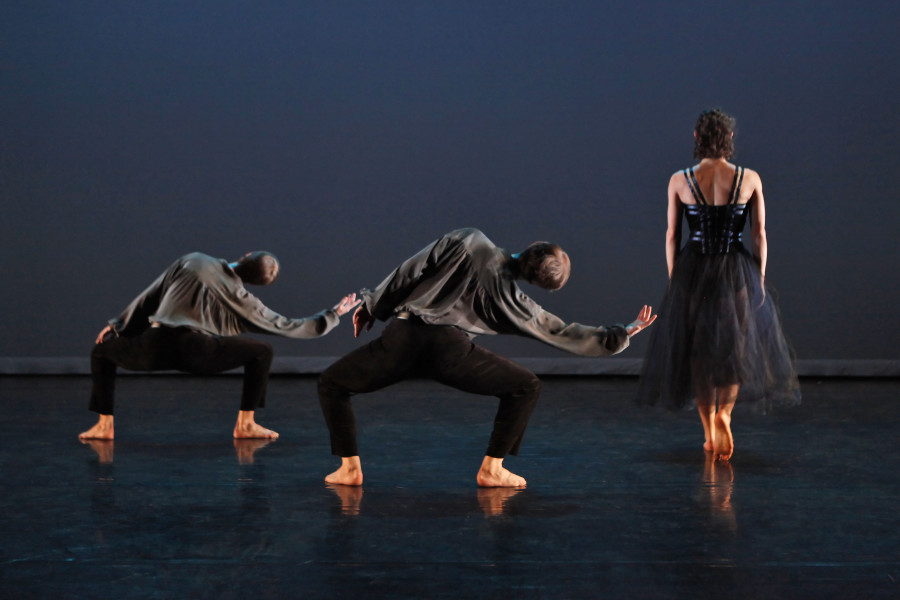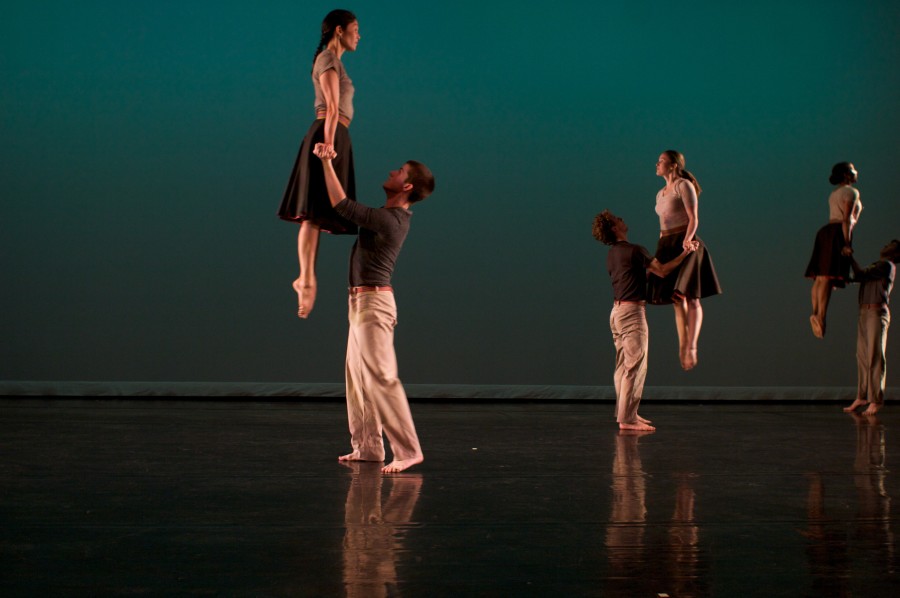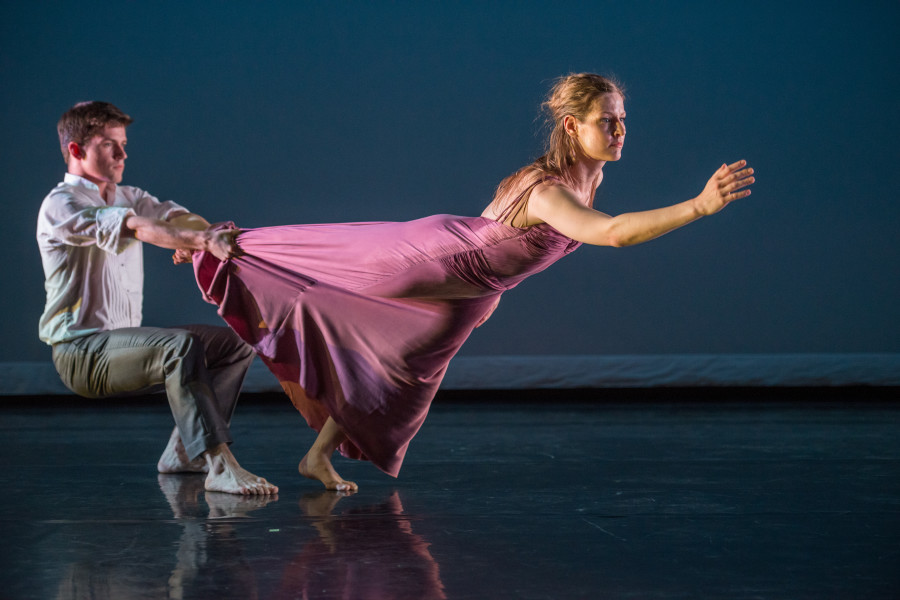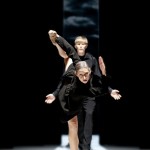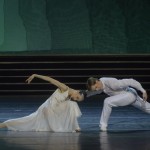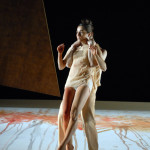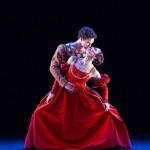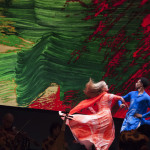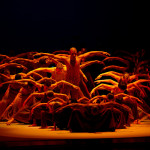The 18th of September proved a global nail-biter, but after Scotland voted to uphold their historically rocky 300-year union with England, Mark Morris’ The Muir and A Wooden Tree, which opened his troupe’s season at Cal Performances in Berkeley one week later, proved a graceful though decidedly eccentric salute to that proud nation, tinged with melancholy and regret.
Amid the lighthearted skipping and tripping by Morris’ strapping swains and shepherdesses through Beethoven’s delectable 19th century arrangements of Scottish and Irish folk songs, we chance upon Walter Scott in a pensive mood (“the quiet lake, the balmy air, the stream, the tower, the tree/ are they still such as once they were, or is the dreary change in me?”) and Robert Burns’ lament of “the lovely lass of Inverness” who mourns the death of her father and brothers in the bloodbath of Culloden that put paid to the Jacobite insurrection. Rita Donahue is heartbreakingly lovely in her increasing isolation: tender moments with Dallas McMurray, Billy Smith and Noah Vinson dissolve as the men fly off into the wings, and she kneels and bows her head in the fading light.
Earlier, the fleet-footed, free-spirited Laurel Lynch refused to be pinned down by admirers as “Sally in our alley.” That said, she and Donahue appear to have made a pretty wild night of it with the boys at the local tavern in “Come fill, fill, my good fellow/… and let us have one bottle more”: racing and tumbling and hitchkicking with increasing abandon – every damn footfall in perfect time to the music of course, this being Morris – until they all collapse from exhaustion.
Baritone Daniel Pickens-Jones, tenor Jonathan Smucker and soprano Angela Arnold – all members of the local Philharmonia Chorale, joined the MMDG Music Ensemble in a bracing rendition of the Beethoven.
The hint of daffiness that permeates The Muir blossoms into lunacy in A Wooden Tree, an interpretive dance to a selection of Scottish singer-songwriter Ivor Cutler’s peculiar gems, taken mainly from his popular radio programmes of the 1950’s onward. An ensemble of lovable misfits – adults costumed as and behaving much like schoolkids – enact rituals of the absurd to largely nonsensical, faux naïf songs.
Ballet to the People found her mind drifting… until Cutler’s weary telegraph operator broke into song in Morse code: “this is my message from the top of the world/ from my little black buzzer beside me/ my bum is cold and my face is white/ it’s very very cold up here/ d- d- d- d- d- d- da dit dit/ dit dit d- da da da…” Meanwhile Sam Black slumped on the floor, his fingers desperately thumping out the rhythm on a chair seat as the ladies of the ensemble skittered and jittered around him in time to the tap-tap-tapping, like electrical sparks. The final woeful “damn the battery’s gone” echoed perfectly our 21st century enslavement to those electronic devices without which we could not possibly make it through our day.
Moments later, the humdrum tale of a family who discover “a wooden tree” in their back yard is elevated to a joyous tribal dance. But ennui sets in once again as Black and Jenn Weddell sit staring blankly at each other, to the accompaniment of Cutler’s plaintive warbling: “You are the centre of your little world and I am of mine/ Now and again we meet for tea, we’re two of a kind/ This is our universe, cups of tea/ We have a beautiful cosmos, you and me.”
An artless programming decision closed the evening with Festival Dance, a perky ensemble work to a piano trio by Hummel, whose endless riffs on social dance, while delightful, wore thin after similar inventions abounded in the prior Scottish numbers. Morris’ trademark musicality and whimsy could not make up for the limited charms of all those long drawn out sessions of Scottish reeling.
The evening was a sensation nevertheless, thanks to Jenn and Spencer – the knockout pas de deux originally set on Jenn Weddell and Spencer Ramirez – danced last night by Weddell and Sam Black. Morris rarely bothers with extended male-female pairings, but the world of dance would be considerably less bleak if he did. Stephanie Sleeper costumed the striking, statuesque Weddell in an alluring low-backed gown of rose silk and Black in a dress shirt and grey slacks. The couple circle each other warily like gladiators, or like bull and matador. They lift their right arms menacingly with flattened palms, as they speed up and tighten the circle. Their interactions occupy a strange yet somehow familiar border territory between tenderness and hostility, and they go for long stretches without looking at each other, even though body parts may be entangled. An overwhelming reminder that even in our most intimate relationships we are, terrifyingly, alone – reinforced by the shattering score, Henry Cowell’s 1925 Suite for Violin and Piano, brilliantly executed by Georgy Valtchev on violin and Yegor Shevtsov on piano.
We sense a shared tragedy as Weddell and Black link arms and stride and stumble along an elliptical path, staring numbly over their shoulders at some invisible horror. Moments later, Black lowers Weddell to the floor where she makes a weird species of snow angel.
In a breathtaking perversion of a balletic promenade, Black grabs one of her ankles and attempts to anchor her as she revolves in violent twists around her own axis and in a circle around him, her head and shoulders scraping the ground as her hips and back arch desperately in the air.
Though we’ve come to expect unexpected endings from Morris, the explosion at the end of Jenn and Spencer still comes as a shock. The couple are spinning in a kind of mad, amphetamine-fueled tango then suddenly… it’s over.
The adoring Berkeley audience gave Morris and company a much-deserved standing ovation. (Most have been faithful followers over the many years MMDG has made its West Coast home at Cal Performances.) Fittingly, Morris bounded on stage in his version of a Scottish tartan: plaid Bermuda shorts.
– This review originally appeared in the Huffington Post. –
